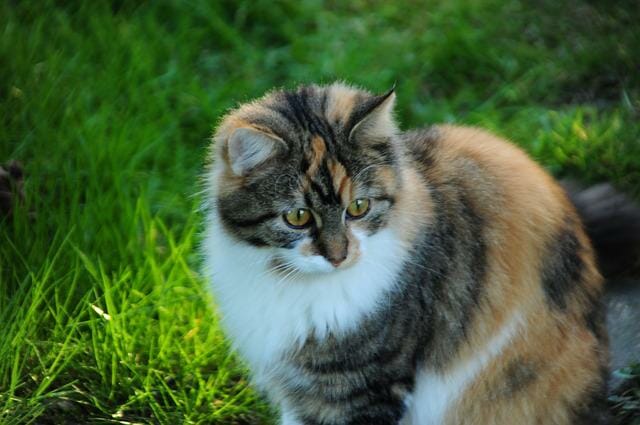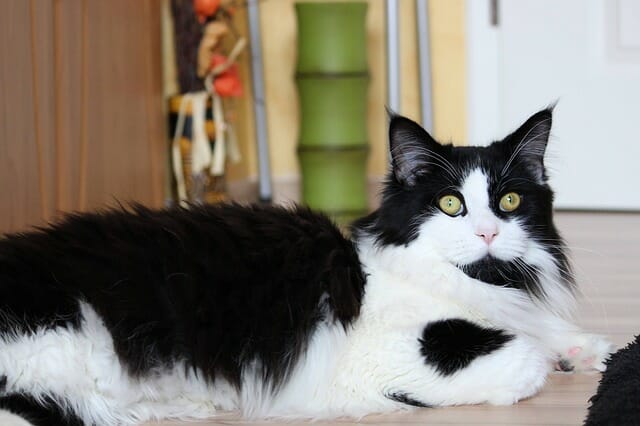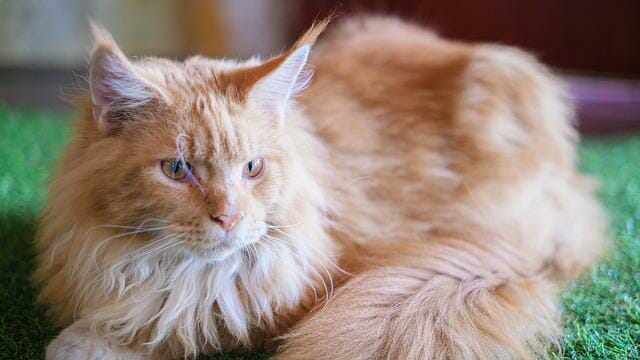Why Are Maine Coon Cats So Big: Reasons Why Maine Coon Cats Are Big
Maine Coon cats are one of the largest domesticated cat breeds, with some male individuals weighing up to 20 pounds, according to VCA Animal Hospital. How big do Maine Coon cats get? Maine Coon cats are known for their large size, often called the gentle giants of the feline world. The exact reasons why Maine Coon cats are so big are not fully understood, but several theories may help explain their size. One theory is that Maine Coon cats evolved to be large to survive in the harsh winters of their native state of Maine in the United States.
Table of Contents
Diet of Maine Coon’s Affecting Its Size


Basic Dietary Requirements
The main Coon’s impressive size can be attributed to its hearty appetite and the specific diet it consumes. Main Coons are known for being voracious eaters, and their diet, which includes high-quality protein sources and balanced nutrition, contributes to their remarkable growth. The combination of the food that Main Coon cats eat and their genetic makeup allows them to attain their substantial size.
Maine Coon cats have similar dietary requirements to other domesticated cats. Their diet should be well-balanced and provide all the essential nutrients to maintain good health. Here are some basic dietary requirements for Maine Coon cats:
- Protein: Maine Coon cats are carnivores and require a protein-rich diet. Protein is essential for their growth and development, as well as for maintaining muscle mass and supporting their immune system. Good sources of protein include meat, poultry, fish, and eggs.
- Fats: Fats are an important source of energy for Maine Coon cats. They also play a role in maintaining healthy skin and coat and supporting brain function. Good sources of healthy fats include fish oil, chicken fat, and vegetable oils.
- Carbohydrates: Maine Coon cats do not require large amounts of carbohydrates, but some can provide energy. Good sources of carbohydrates include whole grains, vegetables, and fruits.
- Vitamins and minerals: Maine Coon cats require a variety of vitamins and minerals to maintain good health. These include vitamins A, D, E, and K and calcium, phosphorus, and magnesium. In addition, a well-balanced diet that includes various foods can provide these essential nutrients.
Ingredients
When selecting cat food for your Maine Coon cat, it’s important to read the ingredients list to ensure that it contains high-quality, nutritious ingredients. Here are some ingredients that you should look for:
- Meat or meat meal: The first ingredient listed on the cat food label should be a high-quality source of animal protein, such as chicken, beef, or fish. Look for whole meats or meat meals, which are concentrated protein sources.
- Fruits and vegetables: Some cat foods contain fruits and vegetables, which can provide essential vitamins, minerals, and fiber. Look for foods that contain nutrient-dense fruits and vegetables, such as spinach, carrots, and blueberries.
- Healthy fats: Fats are important for maintaining healthy skin and coats and providing energy. Look for cat foods that contain healthy fats, such as chicken fat, fish oil, or flaxseed.
- Probiotics and prebiotics: Some cat foods contain probiotics and prebiotics, which can help support digestive health and boost the immune system.
- Grain-free options: Some cat owners prefer to feed their cats a grain-free diet. Look for cat foods such as wheat, corn, and soy free from grains.
Wet Food
Wet food is generally higher in protein and lower in carbohydrates than dry food. It can also help keep your Maine Coon cat hydrated, especially if they don’t drink enough water alone. Wet food may be more palatable for picky eaters and a good option for older cats with dental problems or difficulty chewing.
However, wet food can be more expensive than dry food and spoil quickly if not refrigerated. Once opened, it has a shorter shelf life, can be messy, and leave a strong odor.
Dry Food
Dry food is generally less expensive and easier to store than wet food. It can also help keep your cat’s teeth clean and healthy by reducing plaque and tartar buildup. It can be more convenient for cat owners away from home for long periods, as it does not require refrigeration.
Dry food, on the other hand, is generally lower in protein and higher in carbohydrates than wet food. It can also be less palatable for some cats and may not provide enough moisture, which can lead to dehydration.
Other Factors Affecting Maine Coon’s Size


Genetics
Genetics is a significant factor that affects the size of Maine Coon cats. Maine Coon cats are a breed developed through natural selection and selective breeding. Their size is one of their defining features, and the breeders have worked to select cats with larger frames and bigger bone structures.
Maine Coon cats have a dominant gene that contributes to their size. It is called the “polydactyl” gene, which can result in cats having extra toes on their paws. This gene is also associated with larger body sizes, and Maine Coon cats with this gene may be larger than those without it.
However, genetics is not the only factor that affects the size of Maine Coon cats. Nutrition, exercise, and environmental factors also play a significant role. Therefore, it’s essential to provide Maine Coon cats with a balanced diet and plenty of exercises to help them reach their full potential size.
Gender
Gender is another factor that can affect the size of Maine Coon cats. Generally, male Maine Coon cats are larger than females, while male Maine Coons can weigh between 13 and 18 pounds, while females typically weigh between 8 and 12 pounds.
This difference in size is related to the cat’s hormones. Male cats have higher levels of testosterone, which can promote muscle development and contribute to their larger size. On the other hand, female cats have lower testosterone levels and tend to be smaller in size.
Age
Age is another factor that can affect the size of Maine Coon cats. Maine Coon cats continue to grow and develop until they are about three to five years old. During this time, they can experience significant growth spurts.
Most cats reach their full adult size at around one year old. However, Maine Coon cats take longer to mature, and they continue to grow for several years after reaching maturity. This means that the size of a Maine Coon can continue to change significantly throughout its first few years of life.
After three to five years old, Maine Coon cats typically reach their maximum size. However, they may continue to fill out and gain weight as they age, depending on their diet and activity level. Therefore, providing them with appropriate nutrition and regular exercise is essential to stay healthy and maintaining a healthy weight.
Exercise
Exercise is an essential factor that can affect the size and overall health of Maine Coon cats. Maine Coon cats are active and energetic cats that require regular exercise to stay healthy and maintain a healthy weight.
Without adequate exercise, Maine Coon cats can become overweight or obese, leading to health problems such as diabetes, heart disease, and joint issues. Additionally, a lack of exercise can lead to boredom and destructive behavior, such as scratching furniture or excessive meowing.
Maine Coon cats enjoy playing and interacting with their owners, and many toys and games can help provide them with the exercise they need. Interactive toys such as laser pointers, fishing rods, and puzzle feeders can help stimulate their minds and encourage physical activity. Additionally, providing them with climbing structures, such as cat trees or shelves, can help them burn off excess energy and maintain their muscle tone.
Health


Maine Coon cats are generally healthy cats with long lifespans, but they can be susceptible to certain health issues. Some of the most common health concerns in Maine Coon cats include:
- Hypertrophic Cardiomyopathy: This is a heart condition that can affect Maine Coon cats, causing thickening of the heart muscle and making it difficult for the heart to pump blood efficiently.
- Hip Dysplasia: This is a condition where the hip joint doesn’t develop properly, leading to arthritis and joint pain. It is more commonly seen in large breed cats like Maine Coons.
- Polycystic Kidney Disease: This is a genetic condition that can cause the formation of cysts on the kidneys, which can lead to kidney failure over time.
- Spinal Muscular Atrophy: This genetic condition can affect the nerves that control the spine’s muscles, leading to weakness and muscle wasting.
- Obesity: Maine Coon cats are prone to becoming overweight or obese, leading to various health problems such as diabetes, joint problems, and heart disease.
